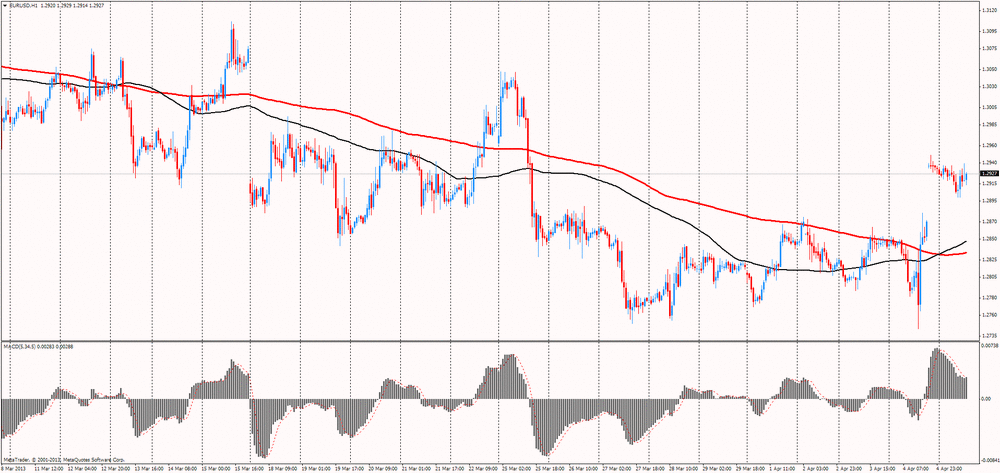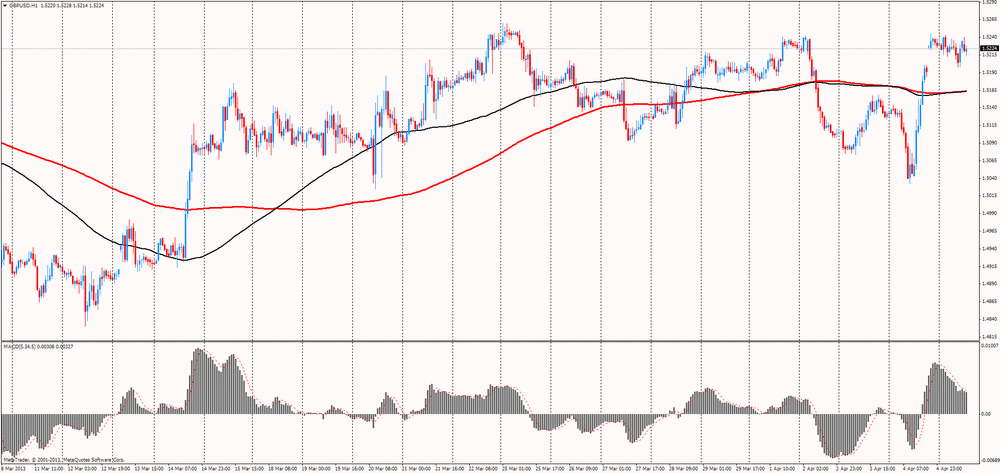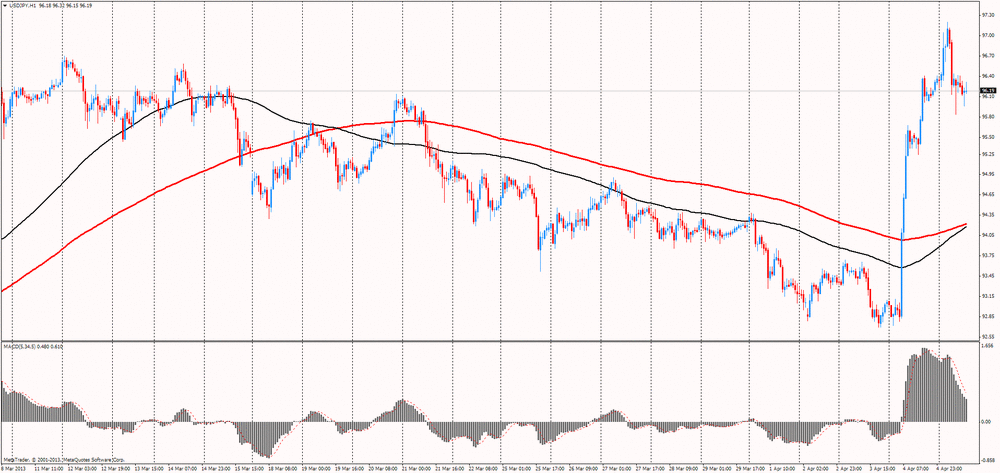Notícias do Mercado
-
20:01
DJIA 14,526.10 -80.04 -0.55%, S&P 500 1,549.34 -10.64 -0.68%, NASDAQ 3,195.93 -29.05 -0.90%
-
20:00
U.S.: Consumer Credit , February 18.2 (forecast 15.7)
-
19:22
American focus: the dollar dropped to the lowest level in more than a week against the euro
The dollar dropped to the lowest level in more than a week against the euro after U.S. employers added fewer jobs in March than forecast, fueling speculation growth in the world’s biggest economy is slowing. U.S. payrolls grew by 88,000 workers last month, the least in nine months, after a revised 268,000 gain in February that was higher than first estimated, Labor Department figures showed in Washington. The median forecast economists was for a gain of 190,000. The labor-force participation rate fell to 63.3 percent, the lowest since May 1979. The jobless rate fell to 7.6 percent, from 7.7 percent. Employers added an average of 186,500 jobs a month over the previous six months.
The greenback fell for a third day versus the shared currency on bets the payrolls data will stiffen the Federal Reserve’s determination to keep buying bonds to spur growth. Fed Chairman Ben S. Bernanke and his Federal Open Market Committee colleagues are deploying record stimulus through an open-ended expansion of the Fed balance sheet after determining that the benefits from stoking a flagging economy outweigh any risk of financial instability or higher inflation.
The yen touched the weakest level since 2009 versus the greenback a day after the Bank of Japan outstripped forecasts and announced unprecedented economic stimulus measures. The dollar jumped as much as 3.6 percent yesterday against the yen, the most since October 2011, after the Bank of Japan said it will increase its bond purchases to 7.5 trillion yen ($73 billion) a month and double the monetary base, which includes cash in circulation, in two years. Policy makers under new Governor Haruhiko Kuroda are working to end 15 years of deflation and two decades of economic stagnation.
Canada’s dollar fell versus most of 31 major peers after the nation unexpectedly lost the most jobs last month since 2009. Employment fell by 54,500 positions, versus a Bloomberg survey forecast for an increase of 6,500.
-
18:23
European stocks close
European stocks slumped the most in five months as U.S. employers hired fewer workers than forecast and airline shares fell as a bird flu spread in China.
U.S. payrolls grew by 88,000 workers in March, the smallest gain in nine months. That missed the median economist for an advance of 190,000 in a Survey and followed a revised 268,000 increase in February.
National benchmark indexes fell in all 18 markets in western Europe today, except Italy. Germany’s DAX retreated 2.1 percent and France’s CAC 40 declined 1.8 percent. The U.K.’s FTSE 100 slid 1.6 percent.
Air France lost 7.5 percent to 6.76 euros, leading a gauge of travel companies in the Stoxx 600 to the biggest slump in more than 18 months. As the death toll in China from the new bird flu strain, known as H7N9, rose to six people, authorities in Shanghai shut several poultry markets and culled birds in an effort to contain the virus.
IAG sank 6.6 percent to 235.6 pence in London and Deutsche Lufthansa AG tumbled 5.1 percent to 14.16 euros in Frankfurt.
EasyJet Plc retreated 6 percent to 1,031 pence, the biggest drop in 13 months, even as Europe’s second-largest discount carrier cut its first-half pretax loss forecast amid a surge in late bookings for Easter.
The world’s airlines suffered a $10 billion loss a decade ago on the SARS outbreak that killed 774 people in 2002 and 2003. At the peak of the outbreak, carriers including including Singapore Airlines and Hong Kong’s Cathay Pacific, cut more than 1,150 weekly flights.
Daimler paced a selloff in carmakers, dropping 2.3 percent to 41 euros in Frankfurt. Bayerische Motoren Werke AG declined 1.9 percent to 66.26 euros, while Renault SA slid 1.5 percent to 49.65 euros in Paris trading.
Basic-resources companies also fell, sending an industry gauge lower for a seventh straight week, the longest losing streak in 13 years. ArcelorMittal retreated 3 percent to 9.23 euros, Xstrata Plc slid 3.3 percent to 1,016 pence and Glencore International Plc dropped 3.2 percent to 337.55 pence.
Telecom Italia SpA climbed 1 percent to 58.4 euro cents, extending yesterday’s 7.8 percent advance, as the company said it’s examining a possible merger with Hutchison Whampoa Ltd.’s Italian division, H3G SpA.
-
17:39
Oil tumbled for the fourth time in five days
West Texas Intermediate crude headed for the biggest weekly drop in six months as U.S. employers hired less than half the number of workers forecast in March, raising concern that economic growth won’t be strong enough to support oil demand.
Prices tumbled for the fourth time in five days after the Labor Department said payrolls climbed by 88,000, the smallest gain in nine months. Economists had expected an advance of 190,000. U.S. inventories increased to a 22-year high in an April 3 Energy Information Administration report as oil production stayed near the most since 1992.
The unemployment rate, derived from a separate survey of households, fell last month to 7.6 percent from 7.7 percent in February, the Labor Department said. The figure, the lowest since December 2008, reflected a 496,000 decline in the size of the labor force. The labor force participation rate fell to 63.3 percent, the lowest since May 1979.
U.S. crude stockpiles expanded by 2.71 million barrels in the week ended March 29 to 388.6 million, the most since 1990, the Energy Information Administration, the Energy Department’s statistical arm, said on April 3. Production was 7.15 million barrels a day.
WTI oil for May delivery dropped 92 cents, or 1 percent, to $92.34 a barrel at 11:46 a.m. on the New York Mercantile Exchange after falling to $91.91, the lowest intraday level since March 21. Prices are down 5 percent this week, heading for the biggest weekly loss since Sept. 21.
Brent crude for May settlement declined $1.68, or 1.6 percent, to $104.66 a barrel on the London-based ICE Futures Europe exchange.
Brent’s premium to WTI narrowed to as little as $12.09, the least since July. Brent has slumped 5.8 percent this year, while WTI is up 0.6 percent.
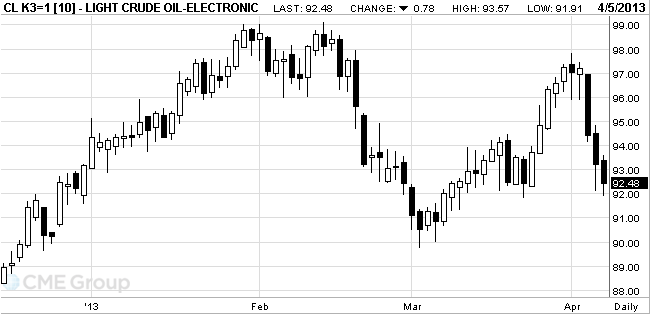
-
17:03
European stocks closed in minus: FTSE 100 6,249.78 -94.34 -1.49%, CAC 40 3,663.48 -62.68 -1.68%, DAX 7,658.75 -158.64 -2.03%
-
16:50
Gold: an overview of the market situation
Gold broke off a three-day decline and showed growth after weak jobs report. Gold prices were lethargic in the first half of today's trading in anticipation of the report on employment in the United States, which gave a negative assessment of the world's largest economy.
Experts said that if the United States will report strong performance, investors will start to look towards the stock markets, which will be more attractive. However, the yield of weak statistics on the labor market has led to an outflow of funds from the stock market in favor of the purchase of precious metal.
As recent data that were released today by the Department of Labor, at the end of last month the number of people employed in non-agricultural area has increased, but it was well below expectations. According to a report on the results of March employers added only 88,000 jobs, compared with a revised upward from the previous month at 268 thousand In addition, it was announced that the unemployment rate unexpectedly fell, reaching a level with 7.6% , compared to 7.7% in February. We add that, according to the average forecast of experts, employment would grow by 185 thousand and the unemployment rate to remain unchanged. Recall that according to the initial assessment, the February growth was 236 thousand
According to consulting firm GFMS, in 2014 after more than 10 years of growth in the gold market will decline due to reduced demand for jewelry, coins and bullion.
Cost June gold futures on the COMEX today rose to 1576.0 dollars per ounce.
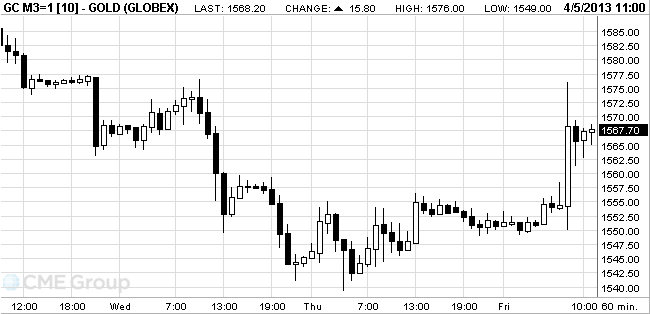
-
15:00
Canada: Ivey Purchasing Managers Index, March 61.6 (forecast 52.3)
-
14:46
U.S. Stocks open: Dow 14,447.45 -1.09%, Nasdaq 3,173.63 -1.59%, S&P 1,540.77 -1.23%
-
14:45
Option expiries for today's 1400GMT cut
EUR/USD $1.2800, $1.2850, $1.2900, $1.2920, $1.2950-55, $1.3000, $1.3060
USD/JPY Y94.00, Y95.00, Y95.50, Y96.00, Y96.50
EUR/JPY Y123.50
GBP/USD $1.4990, $1.5100, $1.5200
EUR/GBP stg0.8550
AUD/USD $1.0400, $1.0510, $1.0525
EUR/AUD A$1.2550
USD/CAD C$1.0100, C$1.0290
-
14:29
Before the bell: S&P futures -1.27%, Nasdaq futures -1.33%
U.S. stock futures fell after data showed the nation added less than half the number of jobs economists forecast in March.
Global Stocks:
Nikkei 12,833.64 +199.10 +1.58%
FTSE 6,228.39 -115.73 -1.82%
CAC 3,650.55 -75.61 -2.03%
DAX 7,663.13 -154.26 -1.97%
Crude oil $92.43 -0.59%
-
14:05
Upgrades and downgrades before the market open:
Upgrades:
Facebook (FB) upgraded to Buy at Argus, target $36
Other:
UnitedHealth (UNH) initiated with a Buy at UBS
-
13:34
U.S.: Average workweek, March 34.6 (forecast 34.5)
-
13:33
U.S.: Average hourly earnings , March 0.0% (forecast +0.2%)
-
13:32
U.S.: Unemployment Rate, March 7.6% (forecast 7.7%)
-
13:32
Canada: Unemployment rate, March 7.2% (forecast 7.0%)
-
13:31
Canada: Trade balance, billions, February -1.0 (forecast 0.2)
-
13:31
U.S.: International trade, bln, February -43.0 (forecast -44.6)
-
13:31
Canada: Employment , March -54.5 (forecast 7.6)
-
13:30
U.S.: Nonfarm Payrolls, March 88 (forecast 185)
-
13:15
European session: the euro fluctuates after yesterday's growth
Data
00:00 China Bank holiday April
05:00 Japan Leading Economic Index February 95.0 97.2 97.5
05:00 Japan Coincident Index February 91.6 91.9 92.1
05:00 Japan BoJ monthly economic report April
07:00 United Kingdom Halifax house price index March +0.5% +0.2% +0.2%
07:00 United Kingdom Halifax house price index 3m Y/Y March +1.9% +1.1% +1.1%
07:00 Switzerland Foreign Currency Reserves March 430.0 427.0 438.3
08:00 United Kingdom BOE Chief Economist Spencer Dale Speaks April
09:00 Eurozone Retail Sales (MoM) February -0.9% -0.3% -0.3%
09:00 Eurozone Retail Sales (YoY) February -1.9% -1.3% -1.4%
09:00 Eurozone GDP (QoQ) (Finally) Quarter IV -0.6% -0.6% -0.6%
09:00 Eurozone GDP (YoY) (Finally) Quarter IV -0.9% -0.9%
10:00 Eurozone ECB Announces 3-Year LTRO Repayment
10:00 Germany Factory Orders s.a. (MoM) February -1.6% +1.2% +2.3%
10:00 Germany Factory Orders n.s.a. (YoY) February -2.5% -1.5% -2.9%
The euro rose against the dollar, recovering from the minimum values of the session, helped by data on retail sales in the eurozone. According to the report, the seasonally adjusted retail sales fell in February by 0.3%, compared with a revised downward from the previous month at 0.9% growth. We add that, according to the average forecast of most economists value of this index was down by 0.4%, compared with the initial estimate of 1.2% growth reported in January. Meanwhile, it was reported that the biggest monthly decline was registered in Estonia, France, Slovenia, and the largest increase was recorded in Luxembourg, Denmark and Malta. On an annual basis, sales in the retail sector declined in February at a slower rate - by 1.4%, compared with a fall of 1.9% in January, which was revised upward from 1.3%. Note that the projected annual sales would fall by 1.3%. In addition, another report showed that orders in the manufacturing sector rose in February by 2.3%, driven by significant growth in demand both within and outside the country. In addition, it was reported that the figure for January was revised down to 1.6% from 1.9% fall. Note that according to the average estimates of analysts, orders had increased by only 1.2%.
The pound was little changed against the dollar and the euro, which is due to market participants' expectations of U.S. jobs report. In addition, the dynamics of trade affected minutes of the meeting of the Bank of England's financial policy, which showed that credit conditions in the UK have improved since November, and it is necessary to closely monitor risk appetite. The market may be too optimistic about the strength of the global economy. At the same time, they reported, it can not exclude further measures aimed at improving the stability of the banks. We also learned that the committee wants to put an end to doubts about banks' capital, and the members of the Committee on financial policies are concerned the ability of some banks to absorb losses.
The yen fell to its lowest level since August 2009, after the publication of new incentives Bank of Japan. Recall that yesterday, the Bank of Japan decided to increase the purchase of government bonds to 7 trillion yen per month, while the analysts' consensus forecast of 5.2 trillion yen. In addition, the Central Bank, which a few weeks ago led the new President Haruhiko Kuroda, a fierce supporter of active easing of monetary policy, has promised to get to the target inflation rate of 2% in two years.
EUR / USD: during the European session the pair fell to $ 1.2900, and then rose to $ 1.2938
GBP / USD: during the European session the pair fell to $ 1.5198, but later I could, and now storge at $ 1.5224
USD / JPY: during the European session, recovered with a minimum value, rising to Y96.19
At 12:30 GMT Canada said the unemployment rate and the change in the number of employees in March, and the trade balance for February. Also at this time in the U.S., there are data on the trade balance for February, the unemployment rate, changes in the number of employed in the agricultural sector, changing the number of employees in the private sector, and changes in the number of employees in the manufacturing sector in March, as well as the change of mean hourly wages for March. At 14:00 GMT in Canada comes from the Ivey PMI index for March.
-
13:00
Orders
EUR/USD
Offers $1.3048, $1.3000, $1.2970/85, $1.2950
Bids $1.2900, $1.2870, $1.2850/40, $1.2825/20
GBP/USD
Offers $1.5315/20, $1.5300, $1.5280, $1.5245-60
Bids $1.5175/70, $1.5150/40, $1.5125/20, $1.5100
AUD/USD
Offers $1.0491/97, $1.0475/80, $1.0445/50
Bids $1.0405/00, $1.0390/85, $1.0380, $1.0365/60, $1.0355/50, $1.0320
EUR/GBP
Offers stg0.8560/65, stg0.8545/50, stg0.8520/25, stg0.8500
Bids stg0.8480/75, stg0.8450, stg0.8410/00
EUR/JPY
Offers Y126.00, Y125.50, Y125.25/30, Y125.00
Bids Y123.50, Y123.05/00, Y122.50
USD/JPY
Offers Y97.75, Y97.50, Y97.25, Y97.00, Y96.70/80
Bids Y95.85/80, Y95.30, Y95.10/00
-
11:00
Germany: Factory Orders s.a. (MoM), February +2.3% (forecast +1.2%)
-
11:00
Germany: Factory Orders n.s.a. (YoY), February -2.9% (forecast -1.5%)
-
11:00
Major stock indexes in Europe down
European stocks posted the biggest three-day drop since November as airlines slumped amid bird flu concerns and investors awaited a report on American payrolls. U.S. index futures fell, while Asian shares climbed.
The Stoxx Europe 600 Index (SXXP) slipped 0.4 percent to 290.52 at 10:11 a.m. in London, extending its drop in the past three days to 2.4 percent as U.S. data on jobless-benefit claims and service-industry growth fell short of forecasts.
IAG led a gauge of travel companies in the Stoxx 600 to a one-month low, falling 4.8 percent to 240.2 pence. The death toll in China from the new bird flu strain, known as H7N9, rose to six people.
EasyJet Plc retreated 4 percent to 1,053 pence, the biggest drop in 13 months, even as Europe’s second-largest discount airline cut its first-half pretax loss forecast amid a surge in late bookings for Easter.
Iberdrola climbed 3.6 percent to 3.79 euros after Bank of America Corp. raised its recommendation for the Spanish utility to buy from neutral, citing an “attractive risk-reward profile.”
Drax increased 1.5 percent to 623.5 pence after HSBC Holdings Plc upgraded the owner of the U.K.’s largest coal-fired plant to overweight, the equivalent of a buy rating.
To date:
FTSE 100 6,304.43 -39.69 -0.63%
CAC 40 3,715.24 -10.92 -0.29%
DAX 7,799.16 -18.23 -0.23%
-
10:19
Option expiries for today's 1400GMT cut
EUR/USD $1.2800, $1.2850, $1.2900, $1.2920, $1.2950-55, $1.3000, $1.3060
USD/JPY Y94.00, Y95.00, Y95.50, Y96.00, Y96.50
EUR/JPY Y123.50
GBP/USD $1.4990, $1.5100, $1.5200
EUR/GBP stg0.8550
AUD/USD $1.0400, $1.0510, $1.0525
EUR/AUD A$1.2550
USD/CAD C$1.0100, C$1.0290
-
10:02
Eurozone: GDP (QoQ), Quarter IV -0.6% (forecast -0.6%)
-
10:00
Eurozone: Retail Sales (MoM), February -0.3% (forecast -0.3%)
-
10:00
Eurozone: Retail Sales (YoY), February -1.4% (forecast -1.3%)
-
09:21
Friday: Asia Pacific stocks close
Asian stocks rose, with Japanese shares surging to the highest closing level in 4 1/2 years, after the Bank of Japan’s new governor announced unprecedented monetary easing to end two decades of economic stagnation. An expansion of monetary easing at the Bank of Japan may trigger “an avalanche” in the yen as Japanese put money elsewhere in anticipation of sustained currency depreciation, billionaire investor George Soros said.
Nikkei 225 12,833.64 +199.10 +1.58%
Hang Seng 21,818.49 -519.00 -2.32%
S&P/ASX 200 4,891.4 -22.08 -0.45%
Shanghai Composite Closed
Japan’s Nikkei 225 Stock Average surged 1.6 percent to 12,833.64, after earlier climbing above 13,000 for the first time since August 2008, as the yen fell against all its major peers.
Exporters Toyota Motor Corp. jumped 3.4 percent and Canon Inc. rose 1.5 percent.
Hong Kong’s Hang Seng Index fell 2.6 percent amid concern an outbreak of bird flu that has killed six people in China may cause an epidemic.
-
09:00
FTSE 100 6,331.38 -12.74 -0.20%, CAC 40 3,733.2 +7.04 +0.19%, DAX 7,822.97 +5.58 +0.07%
-
08:01
Switzerland: Foreign Currency Reserves, March 438.3 (forecast 427.0)
-
08:01
United Kingdom: Halifax house price index, March +0.2% (forecast +0.2%)
-
08:01
United Kingdom: Halifax house price index 3m Y/Y, March +1.1% (forecast +1.1%)
-
07:18
European bourses are seen edging higher Friday: the FTSE up 6, the CAC up 4 and the DAX up 4.
-
07:02
Asian session: The yen fell
00:00 China Bank holiday April
05:00 Japan Leading Economic Index February 95.0 97.2 97.5
05:00 Japan Coincident Index February 91.6 91.9 92.1
05:00 Japan BoJ monthly economic report April
The yen fell to its weakest since August 2009 as investors speculated the Bank of Japan’s 7.5 trillion yen ($77.4 billion) of monthly bond purchases will devalue the currency. Traders yesterday sold the yen after the BOJ’s bond-buying program beat the median 5.2 trillion yen estimated by economists surveyed by Bloomberg. BOJ officials also temporarily suspended a cap on some bond holdings and dropped a limit on debt maturities at the two-day meeting, the first to be led by Kuroda since he took office last month.
The yen’s drop may become like an “avalanche,” billionaire investor George Soros said after BOJ Governor Haruhiko Kuroda yesterday exceeded analysts’ estimates in announcing stimulus measures to spur annual inflation to 2 percent in two years. Soros said Japan’s policies are “really quite dangerous” because if people realize the yen’s sharp slide is liable to continue and want to put money abroad, that could create an “avalanche,” speaking today in an interview on CNBC. “Japan was dying a slow death for 25 years and woke up.”
The dollar headed for weekly losses against most major counterparts before a report forecast to show U.S. job growth slowed last month. A report from the U.S. Labor Department today may show employers added 190,000 workers to payrolls in March following a 236,000 gain the month before, according to the median forecast in a Bloomberg News survey. The jobless rate is projected to hold at 7.7 percent, matching February’s four-year low.
EUR / USD: during the Asian session, the pair traded in the range of $1.2920-35.
GBP / USD: during the Asian session, the pair traded in the range of $1.5215-40.
USD / JPY: during the Asian session, the pair rose to Y97.20.
EZ retail sales due for release at 0900GMT and Germany factory orders at 1000GMT and could provide some morning interest but this will be overshadowed by this afternoon's US employment report. BOE Spencer Dale due to speak at 0800GMT, followed by the release at 0830GMT of BOE Financial Policy committee Minutes, provides the morning's domestic interest but this will be overshadowed by this afternoon's release of key US jobs data.
-
06:31
Commodities. Daily history for Apr 4’2013:
Change % Change Last
GOLD 1,552.40 -1.10 -0.07%
OIL 93.26 -1.19 -1.26%
-
06:31
Stocks. Daily history for Apr 4'2013:
Change % Change Last
Nikkei 225 12,634.54 +272.34 +2.20%
Hang Seng Closed
S&P/ASX 200 4,913.5 -44.18 -0.89%
Shanghai Composite Closed
FTSE 100 6,344.12 -76.16 -1.19%
CAC 40 3,726.16 -28.80 -0.77%
DAX 7,817.39 -57.36 -0.73%
DJIA 14,606.10 55.76 0.38%
S&P 500 1,559.98 6.29 0.40%
NASDAQ 3,224.98 6.38 0.20%
-
06:30
Currencies. Daily history for Apr 4'2013:
(pare/closed(00:00 GMT +02:00)/change, %)
EUR/USD $1,2932 +0,69%
GBP/USD $1,5228 +0,64%
USD/CHF Chf0,9396 -0,60%
USD/JPY Y96,36 +3,41%
EUR/JPY Y124,60 +4,07%
GBP/JPY Y146,74 +4,03%
AUD/USD $1,0428 -0,28%
NZD/USD $0,8417 +0,01%
USD/CAD C$1,0127 -0,18%
-
06:03
Schedule for today, Friday, Apr 5’2013:
00:00 China Bank holiday April
05:00 Japan Leading Economic Index February 95.0 97.2
05:00 Japan Coincident Index February 91.6 91.9
05:00 Japan BoJ monthly economic report April
07:00 United Kingdom Halifax house price index March +0.5% +0.2%
07:00 United Kingdom Halifax house price index 3m Y/Y March +1.9% +1.1%
07:00 Switzerland Foreign Currency Reserves March 427.7 427.0
08:00 United Kingdom BOE Chief Economist Spencer Dale Speaks April
09:00 Eurozone Retail Sales (MoM) February +1.2% -0.3%
09:00 Eurozone Retail Sales (YoY) February -1.3% -1.3%
09:00 Eurozone GDP (QoQ) (Finally) Quarter IV -0.6% -0.6%
09:00 Eurozone GDP (YoY) (Finally) Quarter IV -0.9%
10:00 Eurozone ECB Announces 3-Year LTRO Repayment
10:00 Germany Factory Orders s.a. (MoM) February -1.9% +1.2%
10:00 Germany Factory Orders n.s.a. (YoY) February -2.5% -1.5%
12:30 Canada Trade balance, billions February -0.2 0.2
12:30 Canada Unemployment rate March 7.0% 7.0%
12:30 Canada Employment March 50.7 7.6
12:30 U.S. Average workweek March 34.5 34.5
12:30 U.S. International trade, bln February -44.5 -44.6
12:30 U.S. Average hourly earnings March +0.2% +0.2%
12:30 U.S. Unemployment Rate March 7.7% 7.7%
12:30 U.S. Nonfarm Payrolls March 236 185
14:00 Canada Ivey Purchasing Managers Index March 51.1 52.3
19:00 U.S. Consumer Credit February 16.2 15.7
-
06:02
Japan: Leading Economic Index , February 97.5 (forecast 97.2)
-
06:02
Japan: Coincident Index, February 92.1 (forecast 91.9)
-
